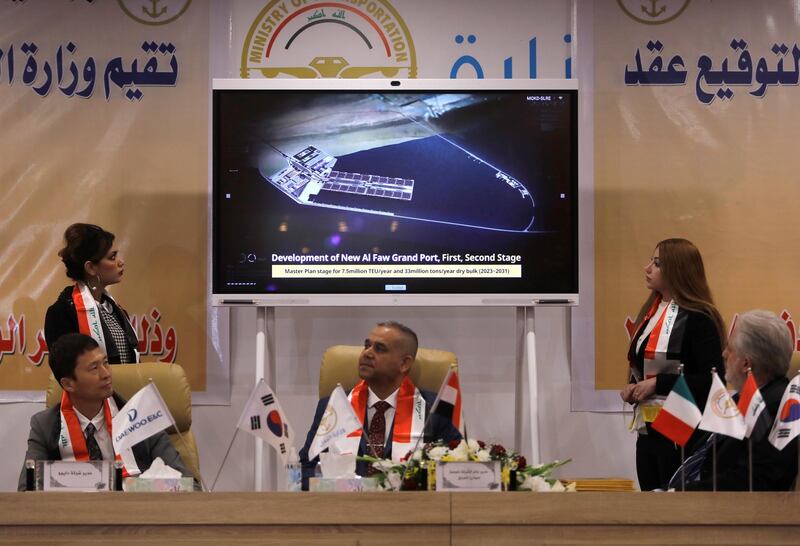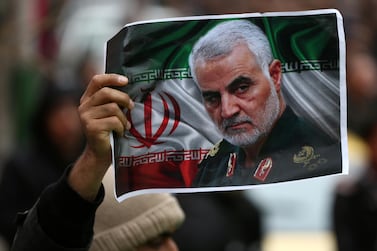The signing of the construction contract for Iraq's Grand Al Faw Port on the Arabian Gulf improves prospects for residents in its southern province of Basra.
Building the port was one of the key demands of protests in Basra that were part of wider anti-government demonstrations that broke out in central and southern Iraq in October 2019.
“It’s a victory not only for Basra, but also for all Iraq,” said Sameer Rahim, an activist who has campaigned for reforms in his home province for years.
Under the $2.62 billion deal signed on Wednesday, South Korea’s Daewoo Engineering and Construction company will build the first phase of the giant port with a capacity to handle three million containers a year, the director general of Iraq’s state-run General Company for Ports, Farhan Al Fartousi, told Reuters.
This includes five berths in which to unload ships, a container yard, and dredging and drilling work to create an access navigation channel, Mr Al Fartousi said. Construction is scheduled to be completed in about four years.
The port has been planned since the latter half of the past century as a way for Iraq to diversify its oil-reliant economy.
Bypassing the Suez Canal with air, road and rail links passing through Turkey, it will make the country a trade corridor between the Middle East and Europe.
But it was only in 2009 that the Iraqi government started working on the feasibility study and design. Work began in earnest in 2012, when Daewoo started building the breakwaters for the port under a separate contract.
Mr Rahim told The National he had hoped the port construction would be awarded to China Machinery Engineering, which also entered a bid for the contract.
He said this was not only because the Chinese company offered deferred loan payments for building the port, but also because it would have accelerated Iraq’s entry to China’s Belt and Road Initiative.
“Oil will vanish sooner or later, but the port and the income from it will continue for years if we managed to join forces with China,” Mr Rahim said.
“Those who will win in the future are the partners of the Chinese dragon, not other countries, as it continues to emerge as a superpower with a strong economy.”
Iraq took steps to join the Belt and Road initiative – a global development strategy involving infrastructure development and investments in almost 70 countries in Asia, Africa and Europe.
In September 2019, Iraq reached a deal with Beijing to fund infrastructure and other projects by Chinese companies. The deal, known as Oil for Reconstruction, involved creating a fund with the revenue from Iraq’s sale of 100,000 barrels of oil a day to two Chinese companies, and loans from Chinese banks up to a limit to $10 billion.
The deal was delayed amid the social unrest and a political vacuum created by the protest movement that began the next month, compounded by the economic crisis caused by plummeting oil prices and the pandemic.
The political and security turmoil after the US-led 2003 invasion affected the plans for Al Faw. The first stage, to receive one million containers a year, was to have been completed by 2019, with capacity increasing gradually to 25 million containers by 2041.
Even the construction of the breakwaters was delayed by lack of funds and the suspension of work after the sudden death in October of a Daewoo executive working on the project.
Mr Rahim is happy that the project is at last moving ahead.
“At least we have some development on the ground that can give us some hope for the future,” he said.
According to the General Company for Ports, Al Faw will create as many as 100,000 jobs.
Basra is Iraq’s second-largest province and has at least 70 per cent of the country’s proven oil reserves of 153 billion barrels. Its location on the Gulf makes it Iraq’s only outlet to the sea and the route for most of its oil exports. But its residents have long complained that they do not get their fair share of revenues from the federal government in Baghdad.
Some residents, including Mr Rahim, are pushing for the creation of a self-ruled region like the Kurdish autonomous region in northern Iraq.
“The region is the only solution for Basra people and we will not give up,” he said.
“Today, we wait for Baghdad to issue decisions on almost everything that are not necessarily in our benefit; we want to take these decisions ourselves to better serve our city.”







